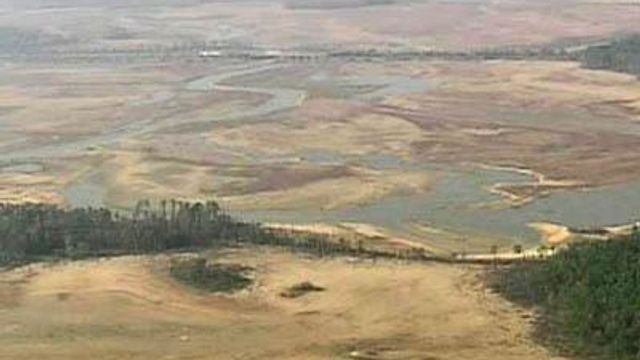Durham Businesses Ordered to Cut Water Usage
With only two months of drinking water left in Durham, city leaders approved tighter water restrictions Tuesday, which call for all businesses to cut water use. However, some businesses say cutting back anymore is not an option.
Posted — UpdatedCity Manager Patrick W. Baker enacted Stage 4 severe mandatory conservation measures. The ordinance allows commercial growers to use "the minimal amount for survival" for their plants.The restrictions continue a ban on all watering and sprinkling of lawns, grass, trees, golf greens and flowers.
Watering vegetable gardens and ornamental shrubs is permitted if a person uses a hand-held hose, container or drip-irrigation system, as had been the case under previous restrictions. That watering can only be done either between 5 a.m. and 8 a.m. or between 5 p.m. and 8 p.m. on Saturdays.
The ordinance orders all industrial, manufacturing and commercial enterprises to reduce consumption by 50 percent. Managers must document their efforts to reach that goal.
Many businesses with which WRAL talked said cutting water consumption that much will be a challenge.
At the White Star Laundry & Cleaners, reducing water consumption isn't an option. The drought has caused a spike in business there.
“It has gone up about 15 [percent]. We now have a lot of customers on wells and they're petrified their wells will run out,” owner Rita Foley said.
Foley said cutting consumption by 50 percent would simply leave her high and dry.
“The only way we could consider conserving water is to tell the public, 'Sorry, you can't use our equipment,'” she said.
“It's tough on everyone,” said Vicki Westbrook, deputy director of the City’s Department of Water Management.
Officials insist they don't want to put companies out of business; however, they must think about the future.
“We have to evaluate the economic impact of this versus not having any water down the line,” Westbrook said.
Like the White Star Laundry & Cleaners, folks at George's Garage restaurant said they have already cut water consumption as much as they can. Water is only by request, and paper plates are an option at lunch.
“If everyone has to go to paper plates, we will go to paper plates [at dinner, too]. If it's not everybody, no one will do it voluntarily,” owner Terry Bakatsias said.
Many companies have cut back on water. At IBM, waterless urinals contributed to a 32 percent decrease.
At Alsco Textile Cleaning Co., usage is down by 38 percent. A spokesman said further cuts would cause them to ship their laundry to other facilities and that could cost at least a half dozen jobs.
As of Monday, two of Durham's main water sources – Lake Michie and Little River – were below capacity. Officials said Lake Michie was 13.9 feet below full and Little River 26.2 feet below full.
With the new restrictions, which go into effect Monday, Dec. 3, city officials hope to decrease the daily water demand by an additional 10 to 20 percent.
At the time, the City of Raleigh doesn't plan to change its water conservation plan. It is under Stage "1.5" water restrictions.
Mayor Charles Meeker said usage has dropped to 41 million gallons per day. He also said the city has 108 days of drinking water left.
• Credits
Copyright 2024 by Capitol Broadcasting Company. All rights reserved. This material may not be published, broadcast, rewritten or redistributed.






